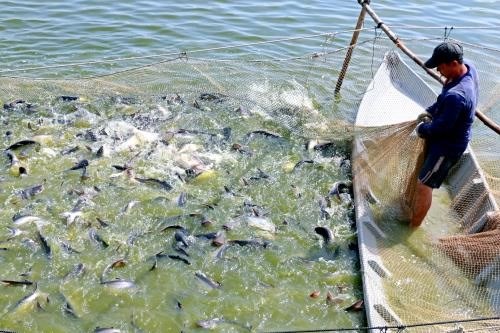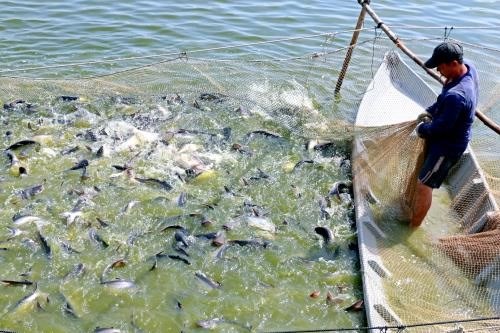
Dong Thap province, already the largest tra fish producer in the Mekong Delta, has further increased the breeding area this year because of the high prices the fish is fetching.

A tra fish
farm in Dong Thap province’s Thanh Binh district.(Source: VNA)
The area has increased by 20 percent to 1,381ha, including 200ha
of new ponds.
The price of the fish at the pond has risen by 5,000-6,000 VND per kilogramme
since last year to 28,000-30,000VND (1.2- 1.3 USD), fetching farmers large
profits.
So far this year nearly 300ha of tra ponds have been harvested, with output
being more than 100,000 tonnes, up nearly 5 percent year-on-year, according to
the Dong Thap Fisheries Sub-department.
Le Hoang Vu, head of the sub-department, said the province is developing a
model of tra farming based on contracts between farmers and processors.
Under the contracts they sign, farmers do not worry about working capital or
selling their output because the processors provide them with fish feed and
farming techniques.
In more than 60 percent of the breeding areas farmers have adopted quality
standards such as global GAP or VietGAP.
Most tra processors in the province either manage to sign deals or have their
own breeding areas to secure more than 60 percent of their raw fish supply.
The prices of the fish are expected to remain high because export demand
remains high while output has not increased much.
With tra fetching high prices, many farmers in Dong Thap are digging ponds even
in unzoned areas to breed the fish.
Tan Hong district and Hong Ngu town have 43ha and 18ha of new ponds in unzoned
areas.
Nguyen Van Hoang, a local in Tan Phuoc commune, said the selling of paddy
fields for turning them into tra ponds has gathered pace in the last two
months.
Nguyen Thanh Tuan, Vice Chairman of the Tan Phuoc commune People’s Committee,
said competent agencies have been ordered to work with farmers to stop the
digging of tra fish ponds in unzoned areas.
People continuing to dig in unauthorised areas would be reported to the
district’s People’s Committee, he warned.
Source: VNA
According to data from the Hoa Binh Provincial Party Committee, the industrial production index for the first six months of 2025 is estimated to have increased by 20% compared to the same period last year. This marks the highest year-on-year growth rate for this period since 2020.
In the first six months of 2025, Hoa Binh province’s export turnover was estimated at 1.145 billion USD, marking an 18.11% increase compared to the same period in 2024. Import turnover was estimated at $ 804 million, a 17.15% increase, which helped the province maintain a positive trade balance.
The lives of the ethnic minority farmers in Tan Lac district have gradually improved thanks to the new directions in agricultural production. This is a testament to the collective strength fostered through the professional associations and groups implemented by various levels of the district’s Farmers’ Union.
With the motto the "product quality comes first,” after nearly one year of establishment and operation, Muong village’s Clean Food Agricultural and Commercial Cooperative, located in Cau Hamlet, Hung Son Commune (Kim Boi district), has launched reputable, high-quality agricultural products to the market that are well-received by consumers. The products such as Muong village’s pork sausage, salt-cured chicken, and salt-cured pork hocks have gradually carved out a place in the market and they are on the path to obtaining the OCOP certification.
In the past, the phrase "bumper harvest, rock-bottom prices" was a familiar refrain for Vietnamese farmers engaged in fragmented, small-scale agriculture. But today, a new spirit is emerging across rural areas of Hoa Binh province - one of collaboration, organisation, and collective economic models that provide a stable foundation for production.
Maintaining growing area codes and packing facility codes in accordance with regulations is a mandatory requirement for agricultural products to be eligible for export. Recently, the Department of Agriculture and Environment of Hoa Binh province has intensified technical supervision of designated farming areas and packing facilities to safeguard the "green passport" that enables its products to access international markets.



